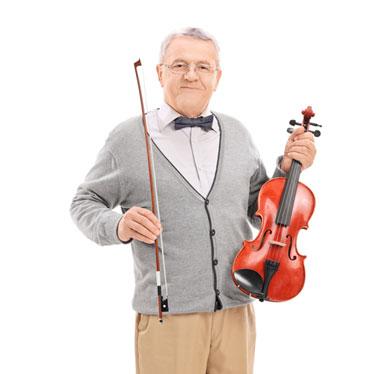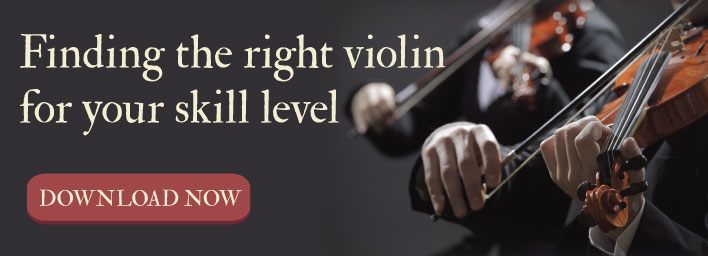Are You Ever Too Old to Learn to Play a String Instrument?

Many people start learning music as children, but for some reason or another, don’t pursue it long enough to develop the skills needed to become proficient. Most experts agree that it takes at least eight years of professional training to achieve “self-learner” status. The place where you can progress on your own without the assistance of a music instructor.
Yet the desire to play music isn’t limited to age, many adults express an interest in learning to play a stringed instrument. Perhaps you find that you have time now that your kids have moved out, and you’d like to enrich your own life with a new skill. Or, maybe you’ve always regretted giving up music and now that you’re older, would like to really apply yourself to the task. However, adult learners have a lot of questions concerning the process, and one of the biggest issues involves wondering whether or not you are ever too old to learn to play violin, or some other stringed instrument.
But, take heart. Both music instructors and neuroscientists agree that it’s never too late to learn music. Indeed, it isn’t the physical or cognitive barriers that keep most adult learners from realizing their goals, it is the mindset of the player. Although naturally, it will be more challenging to learn to play the violin at age 50, rather than at age 8, it is assuredly possible with the right outlook.
These tips and strategies will help you if you’ve decided to begin your music training later in life. By guiding your training path, you’ll see that playing music is like almost any worthwhile pursuit, all it takes is a dedicated frame of mind and the wisdom to realize that you won’t become a virtuoso overnight.
Establish Attainable Goals
One of the worst things you can do is think that because you’re older, that you’ll have an advantage over younger students who look at music training as a chore. Understand that just having the will to make progress doesn’t immediately mean that you’ll have success. Learning a stringed instrument like the violin requires discipline, yes, but it also requires patience. Rather than setting a lofty, vague intention of knowing how to play “X” song in two months, recognize that learning bowing techniques, music notation, and proper intonation takes time; and consequently, set reasonable goals.
Plan Your Education Strategy
Depending on your specific needs, such as scheduling and expenses, choose a training program that will allow you to learn to play violin in a manner that conforms to your individual requirements. For example, if you learn well using texts (reading and interpreting from written works), you may want to pursue a self-taught curriculum. In recent years, the Suzuki method for violin has gained in popularity for its remarkable breakdown of the complex techniques. However, if you feel like personal instruction will help you make better progress, there are many private instructors available. Ask your local instrument dealer for advice on finding private educators.
Moreover, the availability of online software, videos, and other fun ways to learn is incredibly vast, and you can choose a music education that will fit both your personal learning style and your schedule. This link includes a list of 40 different free music education options.
Be Prepared
When you learn to play the violin, or indeed, any instrument, your body will need to adjust to its new demands in movement. Your arms, neck, and back will need to learn new motions, and the strain can produce discomfort during the initial period of adjustment. This is normal. Although it is slightly easier for nimble, young fingers and joints to learn these things, don’t despair. Give your body time to increase its strength. It will happen.
Practice, Practice, Practice
Although adult learners often have a stronger desire to learn to play violin than younger students, they don’t have the advantage of someone making them practice. One of the biggest hindrances to learning a musical instrument when you’re older is that fact that you can decide to skip practice. However, without constant practicing, you’ll never become proficient. You should set aside a certain amount of time each week for practice, and develop ways to maximize the benefit you receive from it. Rote playing and repetition can be discouraging. Find methods that keep you interested while you practice, that way you’ll gain the most benefit.
Learning to play a musical instrument later in life can be challenging. Essentially, you’ll be forging new brain connections, which takes time. However, with the right attitude and a dedicated desire, you can learn to play violin no matter your age, reaping lasting benefits and the satisfaction gained from personal accomplishment.

